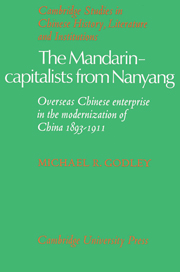 The Mandarin-Capitalists from Nanyang
The Mandarin-Capitalists from Nanyang Published online by Cambridge University Press: 23 September 2009
The years of foreign imperialism in China produced many tales about the humiliation of the Chinese. There was the now notorious park in Shanghai's foreign sector that allegedly excluded both dogs and Orientals as well as the slightly less galling but even more basic expropriation of sovereign rights and national treasure by outside powers and their commercial representatives. It should not be surprising that some of the most widely told anecdotes about the major overseas Chinese capitalists relate instances when these Eastern businessmen bested their foreign rivals, forced acquiescence on a point of prestige, or otherwise gained respect for their business acumen. One such story has to do with an overseas Chinese millionaire known locally as Thio Thiau Siat.
Near the end of the nineteenth century, when China's defeat at the hands of the Japanese had exposed the weakness of the Chinese modernization program, Thio was the dynasty's consular representative in Singapore. Having been ordered to return immediately to China for official consultation, Thio sent an agent to purchase a first-class steamship ticket. The German shipping company that he approached refused to issue the ticket on the grounds that non-Europeans were not permitted to travel in the superior accommodations. Even though Thio was a government official, the management refused to break the long-standing rule and allow a Chinese to purchase passage as a first-class passenger.
The Chinese consul found it difficult to contain his displeasure.
To save this book to your Kindle, first ensure [email protected] is added to your Approved Personal Document E-mail List under your Personal Document Settings on the Manage Your Content and Devices page of your Amazon account. Then enter the ‘name’ part of your Kindle email address below. Find out more about saving to your Kindle.
Note you can select to save to either the @free.kindle.com or @kindle.com variations. ‘@free.kindle.com’ emails are free but can only be saved to your device when it is connected to wi-fi. ‘@kindle.com’ emails can be delivered even when you are not connected to wi-fi, but note that service fees apply.
Find out more about the Kindle Personal Document Service.
To save content items to your account, please confirm that you agree to abide by our usage policies. If this is the first time you use this feature, you will be asked to authorise Cambridge Core to connect with your account. Find out more about saving content to Dropbox.
To save content items to your account, please confirm that you agree to abide by our usage policies. If this is the first time you use this feature, you will be asked to authorise Cambridge Core to connect with your account. Find out more about saving content to Google Drive.